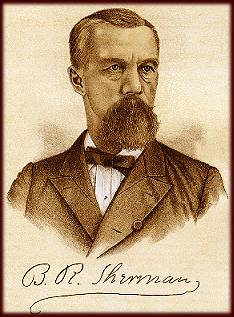Buren R. Sherman
American politician From Wikipedia, the free encyclopedia
Buren Robinson Sherman (May 28, 1836 – November 11, 1904) was the 12th Governor of Iowa, serving from 1882 to 1886.
Buren R. Sherman | |
|---|---|
 | |
| 12th Governor of Iowa | |
| In office January 12, 1882 – January 14, 1886 | |
| Lieutenant | Orlando H. Manning |
| Preceded by | John H. Gear |
| Succeeded by | William Larrabee |
| 8th State Auditor of Iowa | |
| In office 1874–1881 | |
| Governor | Samuel J. Kirkwood Joshua G. Newbold John H. Gear |
| Preceded by | John Russell |
| Succeeded by | William V. Lucas |
| Benton County Judge | |
| In office 1865–1866 | |
| Personal details | |
| Born | Buren Robinson Sherman May 28, 1836 Phelps, New York, U.S. |
| Died | November 11, 1904 (aged 68) Vinton, Iowa |
| Political party | Republican |
| Spouse | Lena Kendall |
| Children | 2 |
| Alma mater | University of Iowa |
| Military service | |
| Allegiance | United States |
| Branch/service | Union Army |
| Years of service | 1861-1863 |
| Rank | Captain |
| Unit | 13th Iowa Volunteer Infantry Regiment |
| Battles/wars | |
Early Life
Sherman was born in Phelps, New York, on May 28, 1836 to Phineas L. and Eveline (Robinson) Sherman.[1][2] He studied law after his family moved to Iowa in 1855 and was admitted to the bar in 1859.[1][2] Sherman then practiced law in Vinton, Iowa in 1860 to 1861.[1] In 1860, he joined William Smyth, a former District Judge, and JC Traer in the creation of Smyth, Traer, and Sherman Law firm.[2]
Military Service
He signed up in 1861 with the 13th Iowa Volunteer Infantry Regiment Company G for the Union Army,[2] retiring as a captain in mid-1863 after being injured at the Battle of Shiloh.[1][2]
Political Career
Summarize
Perspective
Judicial Career

Sherman was elected county judge of Benton County upon his return, serving from 1865 to 1866.[2] He resigned this position to accept a position in the office of the clerk of the district court.[2]
State Auditor
In 1874 he ran for State Auditor of Iowa,[1] that he was elected by a majority of 28,425 over J. M. King, an "anti-monopoly" candidate.[2] In 1876, he was reelected, receiving 50,272 more votes than W. Growneweg, of the Democrat Party, and Leonard Browne, of the Greenback Party.[2] In 1878, he was reelected, receiving majority of 7,164 over the combine votes of Colonel Eiboeck, of the Democrat Party, and G. V. Swearenger, of the Greenback Party.[2]
Governorship
Sherman was elected Governor of Iowa in 1882, Sherman received 133,330 votes, against 83,244 for Kinne and 28,28,112 for D. M. Clark. [2] He was the first occupant of the governor's office in the Iowa State Capitol. However, it was his successor, William Larrabee, who first occupied the office for a full term. In 1883, he ran for a second term, receiving votes of: Sherman, 164,182; Kinne, 139,093; Weaver, 23,089.[2]
During his terms, several new state agencies were authorized, including the state veterinary surgeon office, state bureau of labor statistics and a state oil inspector office.[1] The Legislature also passed, and Sherman signed, an alcohol prohibition act as well as several tax reform bills.[1]
Personal Life
In 1885, he was awarded an LL.D. from the University of Iowa. He was also a freemason who was especially active in Scottish Rite Masonry and helped found the Des Moines Scottish Rite Consistory.
He married Lena Kendall on August 20, 1862 and they had two children.[2]
Sherman died November 11, 1904, and is buried in the Evergreen Cemetery in Vinton, Iowa.[1][2]
References
External links
Wikiwand - on
Seamless Wikipedia browsing. On steroids.
